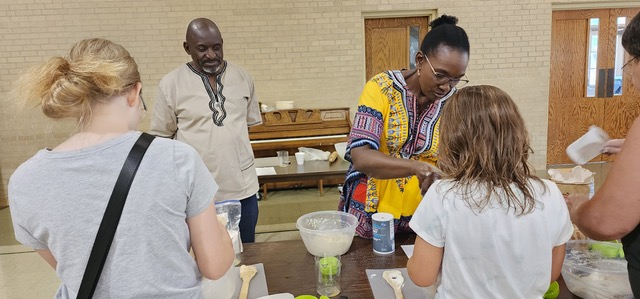Breaking bread together symbolizes sharing and the forging of personal connections. But it was an afternoon of baking bread together that connected two natives of Kenya with members of the Bread Club of Wichita.
David and Lillian Kapten, who came to the United States as college students, were the featured presenters at a recent gathering of the club, which is a nonprofit group that organizes monthly events where bakers of all ages learn to bake, share recipes and make bread. The bread is donated to Children First CEO of Kansas, a social service nonprofit that offers help to low-income families with various needs, including food insecurity.
In the gymnasium of Woodland United Methodist Church, the Kaptens introduced the participating bakers to chapati, a popular flatbread in Kenyan cuisine. The bread was adapted from the naan bread that Indian workers introduced to the country when they were brought to Kenya to build railroads and other infrastructure during British colonization, David explained.
“I’ve made thousands of chapati on here,” Lillian said, holding up a shallow iron skillet she’d brought from Kenya. The circular-shaped bread is cooked on a stovetop.
Making connections with people is something the Kaptens do regularly.
David is the program director of the Breakthrough Clubhouse, which is a social and vocational program that works with people living with severe and persistent mental illnesses. He’s been with Breakthrough, formerly Episcopal Social Services, for 24 years. Lillian is a registered dietician with the Robert J. Dole VA Medical Center, where she is the chief of nutrition.
Both of the Kaptens, who are Quakers and part of the Luhya tribe, the second-largest tribe in Kenya, came to the United States to study agribusiness. They say they feel a connection with Kansas because of the state’s rural agrarian roots, which is much like where they grew up about 200 miles from the Kenyan capital of Nairobi in east Africa.
“It’s a homey environment,” David said of why they’ve stayed and raised their two children in Wichita.
David came to Wichita originally to study at Friends University, where several of his family members attended but ended up attending Hesston College and Bethel College in North Newton.
Lillian studied agribusiness at the historically black Bay Ridge Christian College in Texas.
“I like food and how it grows, how it’s used and the science behind it,” said Lillian, who later earned a master’s degree in public health from the University of Kansas.
When Lillian moved to Kansas for a job, she met David through his brother’s family.
The pair return annually to Kenya, where they still have family and a small farm. David has been working with various organizations in Kenya to bring a Breakthrough Clubhouse program there.
While teaching a group of bakers how to make chapati was a new experience for the Kaptens, the sharing of food is a familiar concept to the couple.
“In the African culture, you cook for whoever wants to show up, so you always have excess food,” Lillian said.
Bread Club members made more than 200 loaves of chapati for distribution to Children First families under the guidance of Lillian, who explained that the process of rolling out the dough, rolling it into a cinnamon roll-like shape and then rolling it out again helps create layers in the thin bread.
She noted that while it’s often made to be eaten with a curry or a stew, it can also be a quick snack.
“I like to have it with my tea.”
Chapati
3 cups all-purpose flour (can use whole wheat flour for half), plus more as needed for kneading
3 tablespoons vegetable oil, plus more for brushing bread
1 teaspoon salt
1 teaspoon sugar
1 egg, lightly beaten
1 1/2 cups warm milk or water
Put flour in a mixing bowl. Add oil to the flour and rub it in to the flour. Stir in salt and sugar. Add egg and water or milk slowly to flour as you knead mixture. Turn it onto a floured surface and knead while adding flour as necessary to reduce stickiness. When dough is ready, it will be a little sticky but soft and bouncy; form into a ball. Let it sit for 15-30 minutes.
When ready to cook, divide the dough into four pieces. Using a rolling pin, roll out one ball into a large, flat rectangle. Brush lightly with oil. Cut each rectangle into four strips. Roll up each strip as you would a cinnamon roll. Flour the surface and roll out each into a flat circle.
Heat the skillet over medium heat. Lay the dough in the skillet and watch for bubbles, then flip and lightly oil the surface of the dough. Repeat until both sides are browned and slightly charred in spots. Wrap chapatis in foil to keep moist. Makes 16 chapatis. Note: Shredded onions or carrots can be added while making the dough.
Win gift certificate
Got a favorite international recipe you’d like to share? Send it to us and we’ll enter you in a drawing for a $25 gift certificate to The Spice Merchant. Send recipes to: The Active Age, 125 S. West St., Suite 105, 67213; or email joe@theactiveage.com.








